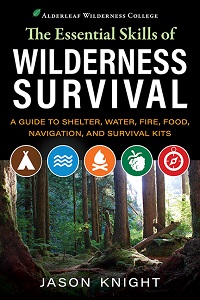Discover the differences between backpacking and camping in the great outdoors. Which one is right for you? Find out in this quick guide!
Are you itching to get out of your routine and explore the great outdoors? Maybe you’re considering a camping trip or backpacking adventure, but do you know the differences between the two?
Decoding the Great Outdoors: Is Backpacking the Same as Camping? is here to help you navigate and choose the right activity for your outdoor journey.
First, let’s clarify what backpacking and camping mean. Backpacking is what the name implies: putting your gear in a pack to carry on your back.
Camping typically involves staying in the same location at a campsite. Usually campsites have convenient bathrooms, fire pits, and tables. Backing does not.
While both activities involve sleeping in a tent and being surrounded by nature, there are significant differences in equipment, skills required, and overall experience.
So whether you want to hike through rugged terrain or relax by a lake with friends and family, it’s important to understand which activity suits your needs before heading out into nature.
This post contains some affiliate links to products that I use and love. If you click through and make a purchase, I’ll earn a commission, at no additional cost to you. Read my full disclosure here.
In This Article
Definition of Backpacking
If you’re looking for a way to challenge yourself and explore the wilderness, backpacking might be just what you need.
Backpacking is a form of outdoor recreation where you hike or walk long distances while carrying all your gear, food, and supplies in a backpack. The goal is to spend several days or weeks in nature, away from civilization.
Backpacking has many benefits, including physical exercise, mental relaxation, and immersion in nature. It’s a great way to disconnect from technology and reconnect with yourself.
Some popular backpacking destinations include national parks like Yosemite in California, Yellowstone in Wyoming, and Glacier in Montana. These parks offer miles of trails through stunning landscapes such as mountains, forests, lakeshores, and canyons.
Now that you know what backpacking is all about, let’s delve into the definition of camping.
Definition of Camping
When it comes to spending time in nature, setting up a temporary home away from home is often referred to as camping. There are many different types of camping, each with its own unique experience. Here are some examples:
- Tent Camping: This is the most traditional form of camping where you set up a tent and sleep on the ground.
- RV or Car Camping: This type of camping involves traveling in an RV or car and sleeping inside or next to the vehicle. This is my wife’s idea of camping (just kidding…sorta)
- Glamping: A more luxurious version of camping that includes amenities such as comfortable beds, electricity, and even hot tubs.
- Backpacking: Similar to tent camping but involves carrying all your gear in a backpack and hiking to your campsite.
Camping has many benefits beyond just enjoying nature. It can help reduce stress levels, improve mood, provide exercise opportunities, and foster a sense of community among fellow campers. Additionally, spending time outdoors can help regulate sleep patterns by resetting our internal clocks with natural light exposure.
As you consider the differences between backpacking and camping equipment, keep in mind that having the right gear can make all the difference in your experience.
Differences in Equipment
Let’s explore how gear for backpacking differs from that needed for a more luxurious camping experience.
Backpacking vs camping: Gear comparison is an essential part of understanding the difference between these two outdoor activities.
When it comes to backpacking, you need to pack all the necessary gear in your backpack because you’ll be carrying it on your back for hours or even days. Therefore, every piece of equipment should be lightweight, compact, and durable enough to survive any harsh weather conditions.
Some essential items for backpacking include a good quality tent, sleeping bag, sleeping pad, stove, and fuel, water filter or purification tablets, headlamp, or flashlight with extra batteries, map and compass or GPS device.
You also need appropriate clothing such as hiking boots/shoes, waterproof jacket, and pants (depending on the season) and other layers depending on the temperature fluctuation of the area you will hike in.
On the other hand, when it comes to camping in a designated campground where you can park your car nearby your site, luxury items like bigger tents with full standing height space inside are possible along with comfortable queen-sized air mattress or cot beds as well as chairs around a fire pit may also be included in your packing list.
The differences in skills required for each activity come down to more than just what equipment is needed.
Differences in Skills
If you’re planning on venturing out into the great outdoors, it’s important to understand the differences in skills required for backpacking and camping.
Physical fitness and endurance are key factors for backpacking, as you’ll be carrying all your gear on your back over long distances.
Navigation and orienteering are also crucial skills to have, especially if you’re exploring unfamiliar terrain.
And finally, knowing how to handle survival and emergency situations can mean the difference between life and death in the wilderness.
Physical fitness and endurance
You’ll need to be in tip-top shape and have the stamina of a long-distance runner to handle the physical demands of backpacking. Here are four things to consider when it comes to physical fitness and endurance for your next wilderness adventure:
- Cardiovascular Endurance: This is the most important aspect of physical fitness when it comes to backpacking. You’ll be walking for miles on uneven terrain with a heavy pack, so having good cardiovascular endurance is essential.
- Strength Training: Building strength in your legs, back, and core will help you carry that heavy pack without putting too much strain on your body.
- Flexibility: Stretching before and after your hike will help prevent injury and soreness, allowing you to tackle longer trails with ease.
- Hydration: Staying hydrated is crucial for any outdoor activity, but especially important during long hikes where water sources may be scarce.
Training tips and health benefits aside, having strong physical fitness and endurance will allow you to fully experience the beauty of nature while keeping yourself safe from harm.
- INSULATED SPORTS WATER BOTTLE: Goodbye sweat! The double wall insulation makes the Iron Flask sweat-free! It keeps your drink COLD for up to 24 hours, and HOT for up to 12 hours. *NOTE: ONLY the 14 Oz, 18 Oz, & 22 Oz fit in cupholders*
- 3 LIDS: YES, Iron Flask comes with THREE different LEAK PROOF lids. Carabiner Straw Lid with 2 Straws, Flip Lid, and a Stainless Steel Lid! *NOTE: The stainless steel lid is plastic from inside and stainless steel from outside*
As you move onto learning about navigation and orienteering, keep in mind that being physically prepared can make all the difference in how enjoyable your trip will be.
Navigation and orienteering
Navigating through the wilderness can be daunting, but with proper navigation and orienteering skills, you can explore new terrains and discover hidden gems in nature.
Map reading is an essential skill that every backpacker should possess. Before heading out on a hike, make sure to study the map of the area to familiarize yourself with the surroundings. Pay attention to landmarks and elevation changes to understand the terrain better.
Another important tool for navigation is a compass. A compass helps you determine your position and direction of travel accurately. Learn how to use it correctly by understanding how it works, setting declination, and taking bearings.
Remember that using a compass requires practice; therefore, take time to master this skill before going on a backpacking trip.
- Rugged handheld navigator with preloaded worldwide basemap and 2.2 inch monochrome display
- WAAS enabled GPS receiver with HotFix and GLONASS support for fast positioning and a reliable signal
With map reading and compass use skills under your belt, you’re now ready to tackle new trails confidently.
However, sometimes even with these skills in hand things can go wrong – like getting lost or encountering unexpected situations such as injuries or extreme weather conditions.
Therefore, it’s crucial that you also acquire survival and emergency skills which we will cover in our next subtopic.
Survival and emergency skills
Now it’s time for you to prepare yourself for the unexpected and ensure your safety with essential survival and emergency skills. When you’re out in the wilderness, there are a lot of things that can go wrong.
Whether you’re backpacking or camping, it’s important to have the knowledge and tools necessary to handle any situation that comes your way.
Here are some key survival and emergency skills to keep in mind:
- Wilderness first aid: Knowing basic first aid can mean the difference between life and death in a remote area. Make sure you have a first aid kit, know how to use it, and take a course on wilderness first aid before heading out.
- Emergency shelter: Even if you’re planning on sleeping in a tent, it’s important to have an emergency shelter as backup. A tarp or bivy sack can provide protection from rain or wind if your tent fails.
- Food and water procurement: If you become lost or stranded, knowing how to find food and water is crucial. Learn about edible plants in the area where you’ll be hiking, bring purification tablets or a filtering system for water sources, and consider carrying extra food just in case.
- Waste management: Leave no trace is an important principle when spending time outdoors. Make sure you know how to properly dispose of human waste (using catholes at least 200 feet away from water sources) and pack out all trash.
Also Read: Emergency Gear For Hiking
With these skills under your belt, you’ll be better equipped to handle any potential emergencies while enjoying the great outdoors. As important as preparation is though – choosing the right activity’s equally so…
Choosing the Right Activity
Picking the perfect outdoor activity requires careful consideration and planning. You have to determine what kind of experience you want and what level of challenge you’re willing to take on.
If you’re looking for a more adventurous and immersive experience, backpacking may be the way to go. It allows you to explore remote areas, enjoy stunning views, and connect with nature in a more profound way. Backpacking also provides physical challenges that can improve your fitness level and boost your mood.
On the other hand, camping offers a different kind of outdoor adventure. It’s ideal if you want a more relaxed experience where you can spend time with family or friends while enjoying nature.
Camping is also more accessible and affordable than backpacking since it doesn’t require as much gear or preparation. However, camping lacks the sense of isolation that backpacking provides, which may make it less appealing for those who crave solitude in nature.
Ultimately, whether you choose backpacking or camping depends on your preferences and goals for your outdoor adventure.
Frequently Asked Questions
What are some common mistakes beginners make when backpacking or camping?
Embarking on a backpacking or camping trip can be like diving into the deep end of a pool. You’re excited, but also nervous about what lies ahead.
As a beginner, it’s easy to make common mistakes that can turn your adventure into a nightmare. One of the biggest mistakes is not bringing essential gear such as proper footwear, navigation tools, and enough water.
Another mistake is overpacking and carrying too much weight on your back. It’s important to do your research beforehand and pack only what you need.
Remember, the goal is to enjoy nature and feel free from the constraints of everyday life. So take it slow, be prepared, and embrace the journey ahead!
How does the environmental impact of backpacking compare to camping?
When it comes to exploring the great outdoors, it’s important to consider the ecological impact of your activities. Whether you’re backpacking or camping, both have a sustainability factor that needs to be taken into account.
Backpacking can have a greater environmental impact due to the long distances traveled and the need for more equipment and supplies. However, with proper planning and responsible practices such as Leave No Trace principles, backpacking can still be done in an environmentally conscious manner.
Camping also has its own set of sustainability challenges, particularly in regards to waste management and potential damage to natural habitats. Ultimately, it’s up to each individual adventurer to do their part in preserving our planet while enjoying all that it has to offer.
Can you bring pets on backpacking trips or camping trips?
Bringing your furry friend on a backpacking or camping trip can be tempting, but it’s important to consider pet accommodations and safety measures.
Did you know that over 1.2 million dogs are killed by cars each year in the United States? This statistic emphasizes the need to keep your pet safe and under control while in nature.
When planning for a trip with your pet, make sure you have all the necessary gear such as a leash, food, water, and waste bags. It’s also important to research the area beforehand to ensure pets are allowed and if there are any specific regulations.
Alternatives to bringing pets include hiring a pet sitter or choosing a pet-friendly campground nearby.
Potential challenges for this subtopic include wild animals that may pose a threat to your pet and unpredictable weather conditions.
By taking precautions and considering alternatives, you can still enjoy nature with or without your furry friend by your side.
What are some recommended backpacking trails or camping locations?
If you’re looking to escape the hustle and bustle of daily life and get closer to nature, both backpacking and camping can be great options. But which one is better? It depends on what kind of experience you’re looking for.
Backpacking allows you to explore more remote areas, often with fewer people around. You’ll need essential gear like a sturdy pack, lightweight tent, sleeping bag, and water filtration system.
Camping is typically more accessible and family-friendly, with amenities like toilets, fire pits, and picnic tables available at many sites. Essential gear includes a high-quality tent or RV, sleeping bags or air mattresses, cooking supplies, and warm clothing depending on the weather.
Whether you choose backpacking or camping, make sure to do your research beforehand so that you have everything you need for a safe and enjoyable trip in the great outdoors!
How can you prepare for extreme weather conditions while backpacking or camping?
When hitting the trails for a backpacking or camping trip, it’s important to be prepared for any kind of weather.
Before you head out, make sure to pack emergency gear like a first aid kit, extra food and water, and a map and compass in case you get lost.
Hydration is key, so bring plenty of water and electrolyte-rich drinks to stay hydrated even in extreme heat.
When it comes to clothing choices, avoid cotton as it can retain moisture and leave you feeling damp and uncomfortable. Opt for moisture-wicking fabrics that will keep you dry and comfortable no matter the weather.
Additionally, don’t forget about shelter options – choosing the right tent or hammock can mean the difference between staying dry during a downpour or getting soaked through your sleeping bag.
By being prepared with these tips for avoiding common mistakes during backpacking or camping trips, you can enjoy the freedom of exploring the great outdoors without worrying about extreme weather conditions ruining your adventure.
Before You Go
So, now that you know the differences between backpacking and camping, which one will you choose for your next outdoor adventure?
Remember, backpacking requires more equipment and skills than camping, but it also offers a greater sense of freedom and exploration. Make sure to choose the activity that suits your preferences and abilities.
Did you know that according to a survey conducted by the Outdoor Industry Association in 2019, backpacking is becoming increasingly popular among Americans?
The study found that over 47 million people participated in some form of backpacking or hiking activity in 2018 alone. This goes to show that more and more individuals are seeking out the challenges and rewards of exploring nature on foot.
Whether you’re a seasoned hiker or new to the world of outdoor recreation, there’s always something new to discover on a backpacking trip.
The Essential Skills of Wilderness Survival

The Essential Skills of Wilderness Survival will empower you to survive emergencies and grow deeper connections to nature, with expert instructor, Jason Knight of Alderleaf Wilderness College
You’ll discover skills that could save your life and the lives of those around you, so that you make it through challenges alive and safe, and can fully enjoy the freedom of exploring the backcountry, without worry.





We are participants in the Amazon Services LLC Associates Program, an affiliate advertising program designed to provide a means for sites to earn advertising fees by advertising and linking to Amazon.com